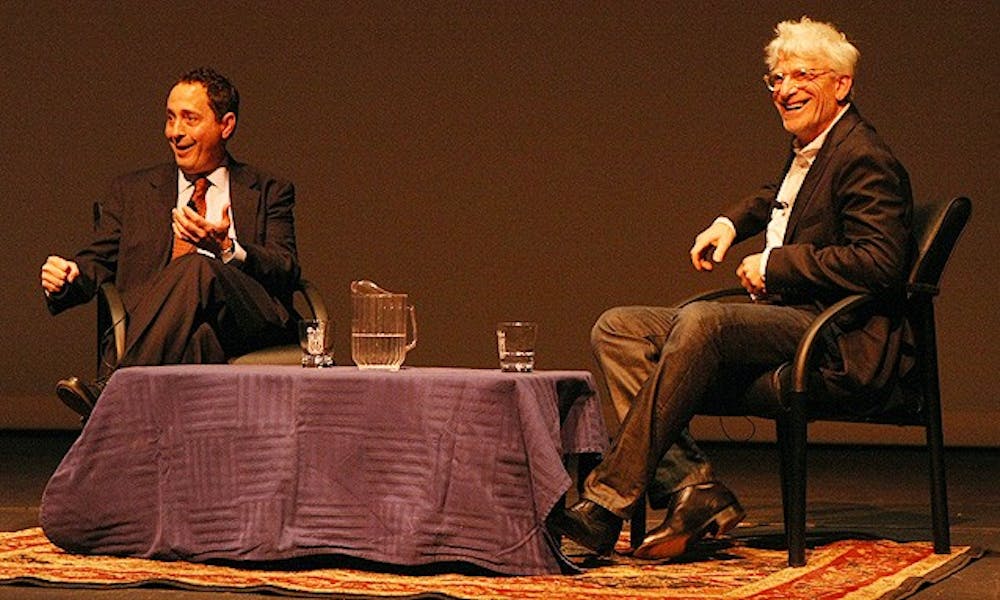Bioethical issues have moved beyond the realm of the health profession and into the living rooms of Americans everywhere.
In a session titled “Medical Ethics as Seen on TV: The Case of ‘House, M.D.’” held Friday, Laurence Kaplow, a consulting producer for the popular television show, joined Jeremy Sugarman, Trinity ’82 and Medicine ’86, and Harvey Meyerhoff, professor of bioethics and medicine at Johns Hopkins University, to discuss the overlap of bioethics and media as part of the 2011 National Undergraduate Bioethics Conference.
With the goal of making the subject of bioethics more approachable to students, the speakers sought to frame the issues through the lens of popular television shows.
“If you actually talk to American people, you find out that for 26 percent of the American public, entertainment is the main source of health information,” Sugarman said.
To illustrate this link between television portrayal and public perceptions of medical information and ethics, Sugarman showed the audience the results of several studies.
He cited a study in which Grey’s Anatomy viewers were asked whether or not an HIV-positive woman could have a baby without HIV before the airing of an episode in which an HIV-positive woman learned that she could. The study showed that after the episode, viewers were more likely to believe that HIV was preventable in offspring than prior to the viewing.
“What you’re seeing—in a real experiment, not a correlation—is that this is having a real impact on people,” Sugarman said. “The higher the dose of this [information], the idea is that you begin to adopt it.”
He noted, however, that there are usually disparities between TV portrayal and reality. On TV, for example, most heart attack victims are young, but in reality, victims are usually older people.
“There were mixed messages going out there,” Sugarman said. “If people are using that as health information, what do we think of that?”
Representing the perspective of an entertainer, Kaplow spoke of the responsibility of writers to be as medically accurate as possible, but he admitted that writers have a tendency to be liberal with the truth.
“We’re telling... people what they should do in certain circumstances, which is very scary,” Kaplow said. “We have to take liberties to keep you interested for 42 minutes—it’s more complicated than it seems.”
Sugarman and Kaplow played clips of “House, M.D.” and discussed the ethical dilemmas introduced. One recurring bioethical theme depicted by the show is the issue of informed consent in a medical context.
“Our show deals with consent a lot,” Kaplow said. “How does anyone without a medical background or degree consent to anything, because [patients] don’t know what [doctors] are actually going to do to [them]?”
Sugarman and Kaplow also discussed the evolving portrayal of doctors on television and the characters on “House, M.D.,” noting that the character Dr. Gregory House often violates the expectations of a medical doctor.
“House speaks what we all think and what we’d like to say at any given moment,” Kaplow said. “He says what we’re all thinking; he says what we’re all feeling; and we’d all love to have that freedom.”
Junior Jarey Wang, co-president of the Duke Undergraduate Bioethics Society, said the main reason Kaplow was invited was because he represented the chance to introduce medical ethics in a way that made these esoteric topics more accessible to students who might otherwise not be aware of bioethical concerns.
“Because almost all students have watched [medical dramas], it was a good opportunity for those who don’t have as much experience in bioethics to be introduced to the field,” Wang said.
Freshman Debbie Xie, a fan of the show, attended the lecture and said she enjoyed the speakers.
“I thought it was really cool to see what the producer of House thinks, especially in terms of what he does for the show and how his own opinions might come up,” she said.
The lecture was a welcome addition to the conference because it explored the dilemmas facing health professionals, Wang said.
“The conference theme is ‘Bioethics: More Personal or More Global?’” Wang said. “That’s the question that we are asking all our participants, whether bioethics is all about the patient or whether there are larger issues we should consider.”
Get The Chronicle straight to your inbox
Signup for our weekly newsletter. Cancel at any time.

